
Human sexual activity, human sexual practice or human sexual behaviour is the manner in which humans experience and express their sexuality. People engage in a variety of sexual acts, ranging from activities done alone to acts with another person in varying patterns of frequency, for a wide variety of reasons. Sexual activity usually results in sexual arousal and physiological changes in the aroused person, some of which are pronounced while others are more subtle. Sexual activity may also include conduct and activities which are intended to arouse the sexual interest of another or enhance the sex life of another, such as strategies to find or attract partners, or personal interactions between individuals. Sexual activity may follow sexual arousal.

Laos, officially the Lao People's Democratic Republic, is the only landlocked country in Southeast Asia. At the heart of the Indochinese Peninsula, Laos is bordered by Myanmar and China to the northwest, Vietnam to the east, Cambodia to the southeast, and Thailand to the west and southwest. Its capital and largest city is Vientiane.
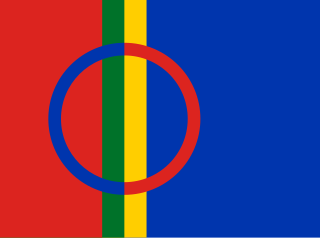
The Sámi are the traditionally Sámi-speaking peoples inhabiting the region of Sápmi, which today encompasses large northern parts of Norway, Sweden, Finland, and of the Kola Peninsula in Russia. The region of Sápmi was formerly known as Lapland, and the Sámi have historically been known in English as Lapps or Laplanders, but these terms are regarded as offensive by the Sámi, who prefer the area's name in their own languages, e.g. Northern Sámi Sápmi. Their traditional languages are the Sámi languages, which are classified as a branch of the Uralic language family.
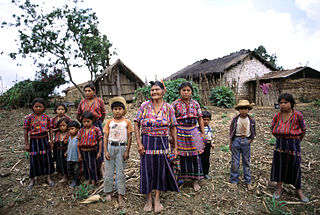
There is no generally accepted definition of Indigenous peoples, although in the 21st century the focus has been on self-identification, cultural difference from other groups in a state, a special relationship with their traditional territory, and an experience of subjugation and discrimination under a dominant cultural model.
Confirmation bias is the tendency to search for, interpret, favor, and recall information in a way that confirms or supports one's prior beliefs or values. People display this bias when they select information that supports their views, ignoring contrary information, or when they interpret ambiguous evidence as supporting their existing attitudes. The effect is strongest for desired outcomes, for emotionally charged issues, and for deeply entrenched beliefs. Confirmation bias is insuperable for most people, but they can manage it, for example, by education and training in critical thinking skills.

Queer is an umbrella term for people who are not heterosexual or are not cisgender. Originally meaning 'strange' or 'peculiar', queer came to be used pejoratively against LGBT people in the late 19th century. Beginning in the late 1980s, queer activists, such as the members of Queer Nation, began to reclaim the word as a deliberately provocative and politically radical alternative to the more assimilationist branches of the LGBT community.

The renminbi is the official currency of the People's Republic of China. It is the world's 5th most traded currency as of April 2022.
An ethnicity or ethnic group is a grouping of people who identify with each other on the basis of perceived shared attributes that distinguish them from other groups. Those attributes can include a common nation of origin, or common sets of ancestry, traditions, language, history, society, religion, or social treatment. The term ethnicity is often used interchangeably with the term nation, particularly in cases of ethnic nationalism.
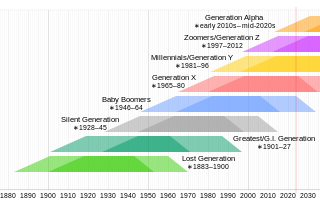
Millennials, also known as Generation Y, are the demographic cohort following Generation X and preceding Generation Z. Researchers and popular media use the early 1980s as starting birth years and the mid-1990s to early 2000s as ending birth years, with the generation typically being defined as people born from 1981 to 1996. Most Millennials are the children of Baby Boomers and older Generation X. In turn Millennials are often the parents of Generation Alpha.

Pansexuality is sexual, romantic, or emotional attraction towards people of all genders, or regardless of their sex or gender identity. Pansexual people might refer to themselves as gender-blind, asserting that gender and sex are not determining factors in their romantic or sexual attraction to others.
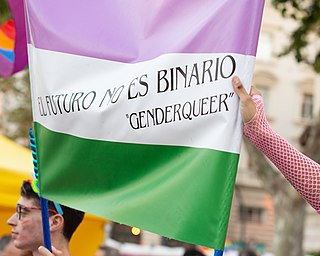
Non-binary and genderqueer are umbrella terms for gender identities that are not solely male or female. Non-binary identities often fall under the transgender umbrella since non-binary people typically identify with a gender that is different from the sex assigned to them at birth, though some non-binary people do not consider themselves transgender.
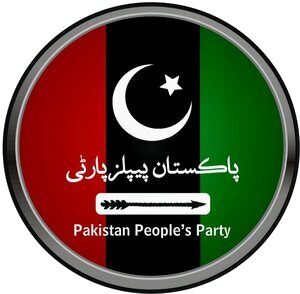
The Pakistan People's Party is a centre-left political party in Pakistan. It is currently the second-largest party in the Senate. The party was founded in 1967 in Lahore, when a number of prominent left-wing politicians in the country joined hands against the military rule of president Muhammad Ayub Khan, under the leadership of Zulfikar Ali Bhutto. It is affiliated with the Socialist International. The PPP's platform was formerly socialist, and its stated priorities continue to include transforming Pakistan into a social-democratic state, promoting egalitarian values, establishing social justice, and maintaining a strong military. The party, alongside the Pakistan Muslim League-Nawaz and the Pakistan Tehreek-e-Insaf, is one of the three largest political parties of Pakistan.

People is an American weekly magazine that specializes in celebrity news and human-interest stories. It is published by Dotdash Meredith, a subsidiary of IAC. With a readership of 46.6 million adults in 2009, People had the largest audience of any American magazine, but it fell to second place in 2018 after its readership significantly declined to 35.9 million. People had $997 million in advertising revenue in 2011, the highest advertising revenue of any American magazine. In 2006, it had a circulation of 3.75 million and revenue expected to top $1.5 billion. It was named "Magazine of the Year" by Advertising Age in October 2005, for excellence in editorial, circulation, and advertising. People ranked number 6 on Advertising Age's annual "A-list" and number 3 on Adweek's "Brand Blazers" list in October 2006.
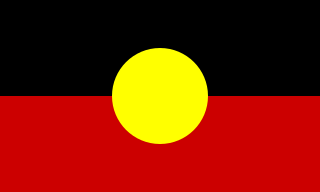
Aboriginal Australians are the various Indigenous peoples of the Australian mainland and many of its islands, but excluding the ethnically distinct people of the Torres Strait Islands. The term "Indigenous Australians" is applied to Aboriginal Australians and Torres Strait Islanders collectively.

The WZ-551 is a Chinese wheeled infantry fighting vehicle family. The name WZ-551 actually covers two families of vehicles with the official designations in the People's Liberation Army (PLA) – Type 90 and Type 92. Over 3,000 WZ-551s are in service with the PLA, where they are used by medium mechanized infantry units.

The Dongfeng EQ2102 is a 3.5 tonne capacity troop/cargo carrier truck developed and built by Dongfeng Motor Corporation and used by the People's Liberation Army of the People's Republic of China for transport. The truck is based on the Nissan Diesel Condor CM series via the joint venture between Dongfeng and Nissan.

China Coast Guard, colloquially recognized as the Haijing (海警), is the maritime security, search and rescue, and law enforcement service branch of the People's Armed Police of China.

Amyotrophic lateral sclerosis (ALS), also known as motor neurone disease (MND) or Lou Gehrig's disease, is a rare and terminal neurodegenerative disease that results in the progressive loss of motor neurons that control voluntary muscles. ALS is the most common form of the motor neuron diseases. Early symptoms of ALS include stiff muscles, muscle twitches, gradual increasing weakness, and muscle wasting. Limb-onset ALS begins with weakness in the arms or legs, while bulbar-onset ALS begins with difficulty in speaking or swallowing. Around half of people with ALS develop at least mild difficulties with thinking and behavior, and about 15% develop frontotemporal dementia. Motor neuron loss continues until the abilities to eat, speak, move, or, lastly, breathe are lost.

A transgender person is someone whose gender identity differs from that typically associated with the sex they were assigned at birth. Some transgender people who desire medical assistance to transition from one sex to another identify as transsexual. Transgender is also an umbrella term; in addition to including people whose gender identity is the opposite of their assigned sex, it may also include people who are non-binary or genderqueer. Other definitions of transgender also include people who belong to a third gender, or else conceptualize transgender people as a third gender. The term may also include cross-dressers or drag kings and drag queens in some contexts. The term transgender does not have a universally accepted definition, including among researchers.
















